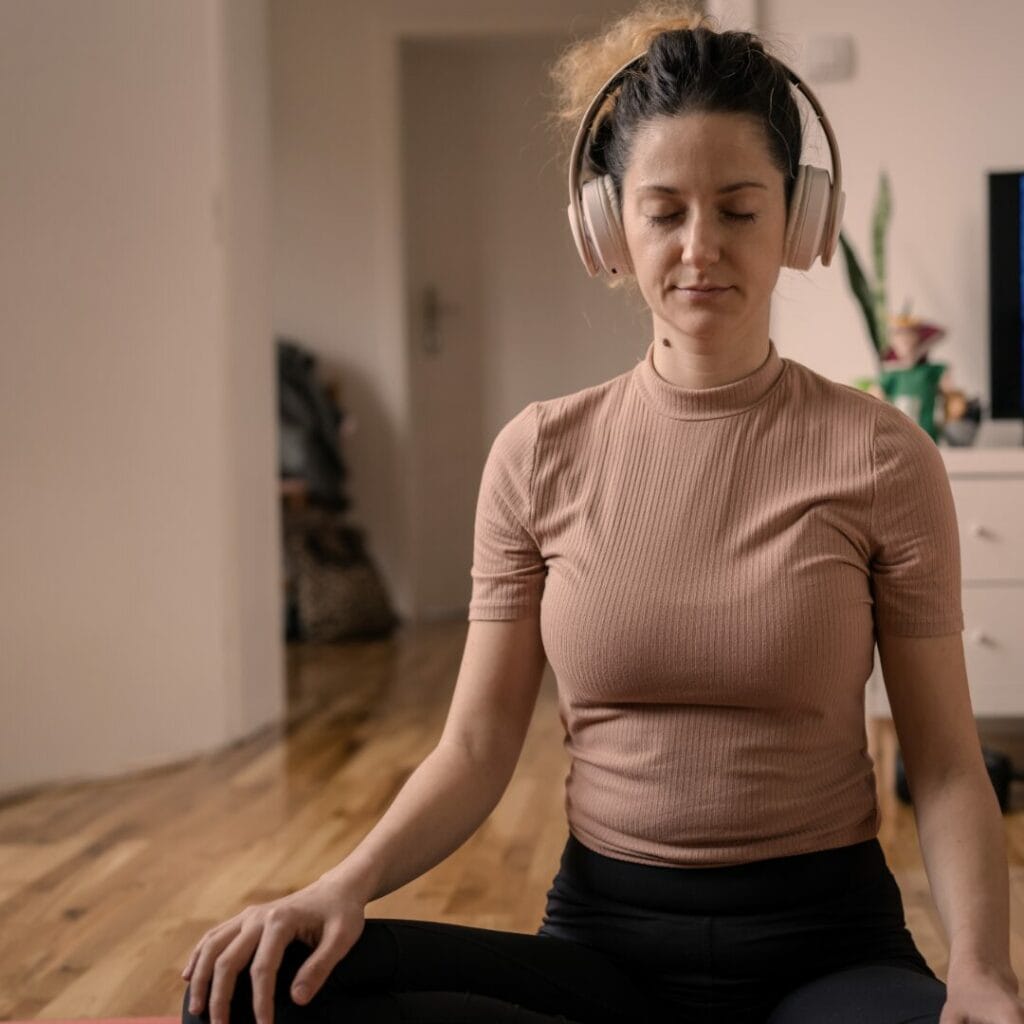Why do you get bad anxiety before work and how to manage it: the 10 best strategies to reprogram your mind and regain calm before and after work every day.
“We suffer more from imagination than from reality.” – Seneca, Letters from a Stoic, 65 AD
When you experience bad anxiety before work, knowing what to do can seem like a mystery. The sudden feeling of worry, the accelerated heartbeat: everything seems out of control. It’s as if an invisible force is gripping your chest, obstructing your breathing, and clouding your thoughts.
At times like these, you just wonder what to do right away. The more you try to fight bad anxiety before work, the more you feel like you are swimming in a rough sea, not knowing which direction to go.
In this article, we present 10 practical strategies for managing bad anxiety before work as effectively as possible. You will learn what to do immediately and in the long run to regain control, both during acute anxiety attacks and during times of general widespread anxiety. Are you ready to find out what to do when you have bad anxiety before work and regain control of your life?
Disclaimer: The information provided in this article is for informational purposes only and does not constitute medical advice. If you are facing mental health problems, it is strongly recommended that you consult a qualified physician or specialist immediately for individualized evaluation and treatment.

Why do I get bad anxiety before work
Do you often feel bad anxiety before work? You’re not alone. Many people face this challenge daily. Why does it happen? The pressure to perform and meet job expectations can be overwhelming. Difficult relationships with colleagues or supervisors only make it worse. Do you dread a heavy workload or fear making mistakes? These worries add to your anxiety, which can explode before retuning to work on Monday.
On top of that, personal factors like lack of sleep, poor work-life balance, and underlying mental health issues can amplify these feelings. Understanding why you get bad anxiety before work is essential. It’s the first step to finding effective strategies to manage and reduce your anxiety, leading to a more balanced and productive work life.
But don’t worry – understanding why you get bad anxiety before work is the first step. In this article, we’ll discover 10 effective ways to overcome it, helping you achieve a more balanced and productive work life.
Bad Anxiety Before Work: 5 Hacks for Instant Relief
1. The 333 rule
The 333 Rule is an effective anchor technique for managing anxiety before work. Often also called the “Rule of Three,” it involves identifying 3 things you can see, hear and touch.
This simple exercise encourages you to reconnect with your physical environment, providing a tangible way to calm anxiety.
You can apply the 333 rule whenever you begin to feel anxiety emerging. Remember to allow yourself time to focus fully on each of the identified objects.
To apply this rule, follow these 3 simple steps:

- Focus on 3 things you can see: Focus on what is around you to become visually aware of your environment. Look at large objects like a tree or a chair, or look for smaller details like a pencil or a coin. The goal is not to find specific objects, but to immerse yourself in the world around you to divert your attention from the swirl of anxious thoughts.
- Focus on 3 things you can hear: Identify sounds present in the environment to shift the focus from your mind to the outside world. If you are in a quiet place, you might hear the ticking of a clock or you can drum your fingers on the table and focus on the sound. Outdoors, you might hear the rustling of leaves or the passing of cars.
- Focus on 3 things you can touch or move: Find three objects that you can easily touch or move. These can be objects near you or parts of your own body. This is a quick way to reconnect with the physical world, helping you feel anchored and present in the moment.
2. Diaphragmatic breathing
If you have anxiety before work, try this exercise right away. Close your eyes, place one hand on your stomach and begin to breathe in slowly through your nose. Focus on the feeling of your stomach expanding as you do this. Then slowly exhale through your mouth, feeling your stomach retract.
This technique, also known as diaphragmatic breathing, is supported by research as an effective way to immediately reduce anxiety. Controlled breathing slows the heart rate and calms the nervous system, helping to reduce feelings of tension and anxiety. Repeat this cycle for a few minutes. As your breathing stabilizes, your mind and body will also follow suit.

In addition to breathing, it may help to repeat one of these reassuring phrases in your mind or aloud:
- “This is just a symptom of anxiety.”
- “I know it will only last a few minutes and then it will pass.”
- “It is normal to feel anxiety right now.”
3. Muscle relaxation
When you feel anxiety before work, the muscle relaxation technique can give you immediate relief. This method involves tensing and relaxing muscles throughout the body to reduce the feeling of anxiety.
To practice it, start by lying down or sitting in a comfortable, quiet position. Then follow these simple steps:
- Start with your hands: clench your fists tightly for 5-10 seconds, focusing on the feeling of tension in your hand and forearm muscles.
- Relax your fists: release the tension in your hands and forearms slowly, feeling the sensation of relief as your muscles relax completely.
- Continue with your arm muscles: gently lift your arms and contract your biceps muscles for a few seconds, then relax them completely.
- Continue with the rest of the body: gradually move up or down, contracting and relaxing the muscles of the triceps, shoulders, neck, face, chest, back, abdomen, legs, and feet.
- Focus on the sensation of tension and relaxation in each muscle group as you proceed. Breathe slowly and deeply as you perform this technique. Repeat the process several times, if necessary, until you feel decreased anxiety and a greater sense of calm.

4. The torch of rationality
When you have bad anxiety, finding relief through thinking itself can seem counterintuitive. However, anxiety often stems from a feeling of uncertainty. Rational reflection can help you better understand the sources of your uncertainty and address them more clearly.
Begin by analyzing anxious thoughts. Question the validity of the worries with these questions:
- “What is uncertain about this situation?”
- “What can I test to support or contradict these concerns?”
- “Which thoughts are true? And which are exaggerated?”
- “What is the worst-case scenario?
- “What, on the other hand, is the most likely scenario?”

Use rationality as a flashlight and challenge anxiety-fueling thoughts. For example, if you worry about a future event, rationally assess the likelihood of your fears coming true. Examine the evidence objectively.
When you deal with an anxious thought rationally, anxiety loses its power. And the ghosts disappear.
5. Instant physical exercise
When you have anxiety before work, remember to consider not only the mind, but also the role of the body. Physical symptoms such as labored breathing, rapid heartbeat, and muscle tension can intensify the sense of anxiety.
Physical activity is a simple and always available tool for calming the body and mind. Exercise not only distracts the mind from anxiety, but also releases endorphins, the neurotransmitters that improve mood and induce a feeling of well-being. Even a short walk can make a difference.
Here are 3 practical ways to incorporate physical activity into your anxiety management routine:

- Restorative walk: Spend as little as five minutes taking a walk outdoors or inside your home. Focus on the movement of your body and the feel of your steps, letting the fresh air and change of scenery soothe your anxiety.
- Deep breathing and movement: Practice deep breathing exercises as you move. Inhale slowly as you raise your arms and exhale as you lower them. This helps relax your muscles and calm your mind.
- Hands-on activity: Choose a physical activity you enjoy, such as dancing, yoga or gardening. You can also choose to engage in housekeeping. The important thing is to find a manual activity that gets you out of your head and back into your body.
Bad Anxiety before Work: 5 Impactful Strategies
1. Exposure Therapy
Exposure therapy is a powerful psychology-based technique for dealing with fears and desensitizing oneself to them. It consists of deliberately confronting one’s sources of anxiety to redefine the aspect of danger or fear associated with the situation or stimulus.
This technique has proven its effectiveness in reducing anxiety. Here’s how to apply it in 8 progressive steps:
- Rank Your Fears: List your fears, sorting them from most threatening to least threatening. Having a list will help you plan your exposure path.
- Choose a Least Threatening Fear: Start gradually and choose one of your least threatening fears to address first. Addressing lesser fears will prepare you for the bigger ones.

- Reflect on the Feared Situation: Consciously expose yourself to the feared situation. Reflect on the thoughts and feelings that emerge.
- Devise a Small-Step Plan: Devise a series of small steps to gradually deal with the feared situation. Gradually decrease the distance between you and the feared situation or increase the time spent in it.
- Resist the Impulse to Flee: Use relaxation techniques, breathing and positive affirmations to manage anxiety. Stay Present: It is important not to avoid the situation.
- Appreciate Progress: After dealing with the situation, recognize that nothing bad has happened. Every success, big or small, helps build confidence.
- Repeat the Exposure: Repeat the exposure as often as possible. Repetition builds confidence and desensitization.
- Face Another Fear: When you feel ready, move on to a new feared situation and face it with the same approach. As you continue at this pace, you will be able to overcome bigger and bigger fears.
2. CBT
Cognitive behavioral therapy (CBT) is a powerful method for dealing with anxiety before work. This approach has been shown in some cases to be more effective than antidepressants, as explained in the book “Feeling Good. The new mood therapy” by David Burns. By focusing on changing your beliefs that fuel this emotion, it can help you to:
Identify Anxious Thoughts: For example, if you suffer from social anxiety, you might think, “Everyone thinks I’m boring” or “I never know what to say.”
Influencing Your Beliefs: Your beliefs influence your thoughts, which in turn guide your feelings and behaviors. If you believe everyone has to like you, an interruption in a conversation might make you think, “They hate me,” increasing your anxiety.
But how to do it concretely? There are several strategies:

- Internal Rational Speech: Monitor your inner dialogue and replace irrational thoughts with more rational ones. Example: Change “Everyone thinks I am boring” to “I cannot know what others think of me, and it is not possible to please everyone.”
- Reality Test: Check the validity of your negative thoughts. Example: Ask yourself if there is concrete evidence to support the thought “I never know what to say” or if it is just a negative perception of yourself.
- Attention Training: Learn to shift your attention from anxious thoughts to more positive or neutral ones. Example: When you feel anxious, focus on an activity you enjoy or a positive thought.
- Cognitive Challenge: Challenge your fears and harmful beliefs. Example: If you fear being boring, try participating in a conversation with the intention of actively listening rather than worrying about what to say.
- Thought Restructuring: Change your negative thought patterns to more positive and realistic ones. Example: Turn “Here, they hate me” into “Maybe the person was just in a hurry.”
To learn more about this revolutionary perspective and make your thoughts your best allies, read our article titled “How to Harness the Power of Thoughts: 10 Surprising Ways”.
3. Journaling
Anxiety can make it really hard to stop worrying, be it before or after work. You might have worries that you can’t control. Or you might feel the need to keep worrying because it seems helpful, or because you feel that bad things might happen if you stop.
To deal with these worries, it can be helpful to try doing so intentionally. For example:
- Reserve a Specific Moment for Your Worries: Set aside a specific time of day to focus on your worries, such as in the afternoon or right after dinner as part of a night routine. This helps keep worries from taking up your entire day, reassuring you that you will still have a moment to think about them.
- Set a Timer: Decide how much time to devote to your worries, for example by setting a timer for 15 minutes. During this time, focus exclusively on your anxious thoughts. When the timer rings, close this chapter and return to your daily activities.
- Write down Your Worries: Keep a journal in which you write down all your anxieties and negative thoughts. Alternatively, you can write your worries on small pieces of paper and place them in an envelope or jar.
- Keep Worries in a Specific Place: Choose a particular place to keep your written worries, such as a dedicated journal or worry jar. Knowing that your worries are “stored” in a physical place can give you a feeling of control and order.

4. Mindfulness
If you tend to have bad anxiety before work, mindfulness may be the key to bringing calm back into your life. Mindfulness is becoming increasingly popular as people begin to realize its benefits.
Here are some examples of how you can use meditation to better manage anxiety before work and live more peacefully:
Mindfulness Meditation: Find a quiet place, sit comfortably and close your eyes. Focus your attention on your breath: feel the air go in and out of your lungs, the rising and falling of your chest. If your mind gets distracted, gently bring your attention back to the breath without judgment. This simple but powerful practice can calm the mind and significantly reduce anxiety.

Guided Meditation: Guided meditations, available as audio or video, offer step-by-step instructions and often include visualizations and breathing techniques. They are ideal for those who are just starting out and need structured guidance. Try following a guided meditation each day to experience a growing sense of calm.
Gratitude Meditation: Close your eyes and think of three things you are grateful for. Gratitude can shift your focus from anxious thoughts to positive ones, improving your mood and reducing anxiety. This simple practice can transform your mental state in a matter of minutes.
Visualization Meditation: Imagine a place that makes you feel peaceful and happy, such as a sunny beach or a peaceful forest. Visualize the details: the sounds, the smells, the colors. Immerse yourself completely in this scene. Visualization can help you find a haven of mental peace.
There are many resources available to help you develop a mindfulness practice. If you would like to learn more about this transformative perspective or learn how to meditate, you can read our article titled “Morning Meditation: 10 Techniques to Change Your Life in 15 Minutes”.
5. The power of acceptance
It may not be what you expect to feel. But one of the most effective ways to relieve anxiety before work is to accept it.
The Anxiety and Depression Association explains it this way, “The thoughts you resist, persist.” When we let anxiety take its course without fighting it, paradoxically, it becomes less intense. On the other hand, fighting anxiety is what typically triggers a panic attack.
If your only strategy is to distract yourself from the anxiety or avoid the things that cause it, you will always be afraid. It will always be your worst fear because you never learned how to deal with it. Instead, try these 4 steps:
- Recognize and understand your anxiety: Try telling yourself, “My nervous system is activating because I am worried about….”

- Don’t criticize yourself for these feelings: Instead, try telling yourself, “This is a normal and healthy response of my body to these circumstances, whether they are complicated, stressful or difficult. It’s okay to feel this way.”
- Know that you can have anxiety and still function well: You can do your activities very well despite anxiety, and you probably have in the past.
- Remember a time at work when you were anxious but still did what you had to do. Maybe you were filled with anxiety before an event or meeting. But then, someone said you did a great job.
If you want to learn more about how the way you talk is affecting your happiness, read our article “How to Live a Happy Life: 10 Words to Eliminate in 2024.”
Follow us on social media
